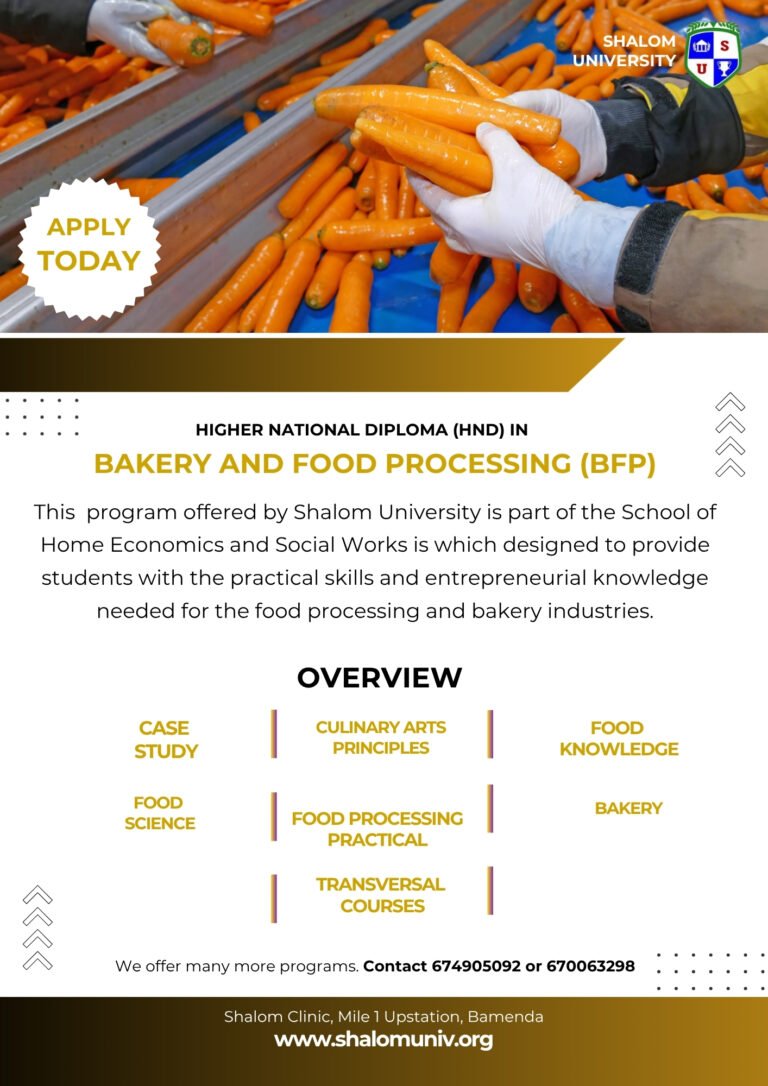In Cameroon, the well-being of communities and families is a complex and pressing issue, particularly amidst ongoing social, economic, and humanitarian challenges. From supporting vulnerable children and families displaced by conflict to assisting individuals with disabilities and addressing issues of poverty and inequality, the role of a skilled and compassionate social worker is more critical than ever. The HND in Social Work (SOW) at Shalom University in Bamenda is specifically designed to train these essential professionals, offering a practical and human-centered program that prepares graduates to serve communities across the nation.
The curriculum at Shalom University is tailored to the Cameroonian context, blending core social work theories with practical, hands-on experience in addressing local community needs. Graduates are prepared not only to work directly with individuals and families but also to understand the broader social welfare systems and organizational management, ensuring they can contribute to positive change at both micro and macro levels.
The SOW Curriculum at Shalom University
The HND in Social Work program at Shalom University is structured around a set of core papers that provide a comprehensive and practical education in the field.
Paper: Case Study
The Case Study paper is a vital component that integrates all the theoretical knowledge and practical skills gained throughout the program. It challenges students to analyze complex social situations, from a family struggling with displacement to an individual facing addiction or mental health issues. This is particularly relevant for social workers in Cameroon, who must navigate diverse cultural norms, limited resources, and evolving social dynamics.
The course trains students to:
- Analyze real-world social challenges: Based on a given case, students evaluate the circumstances and needs of individuals, families, or communities in Cameroon.
- Identify critical issues and underlying causes: They pinpoint specific problems related to poverty, conflict, family dysfunction, or health disparities and explore the underlying social, economic, and psychological factors.
- Propose evidence-based interventions: Students formulate practical recommendations based on social work principles, local resources, and community-specific approaches. For example, a case study might involve a family displaced by conflict, requiring a proposal for psychosocial support, access to essential services, and long-term reintegration strategies.
- Defend their decisions: During formal presentations, students must justify their analysis and proposed interventions, demonstrating their critical thinking and communication skills, which are essential for effective social work practice and collaboration with stakeholders.
Paper: Principles and Approaches in Social Work Practice
This paper provides students with the theoretical and ethical foundation of social work. It explores the core principles, values, and diverse approaches that guide social work practice, ensuring that students understand the “why” behind their actions.
Key topics include:
- Social Work Ethics: The core ethical principles of social work, including human dignity, social justice, and respect for diversity, which are fundamental to practice in Cameroon’s multi-ethnic society.
- Theoretical Frameworks: An overview of various social work theories, such as systems theory, ecological perspective, and strengths-based approaches, and their application to different social problems.
- Practice Models: Introduction to different models of social work intervention, including casework, group work, and community organization.
- Cultural Competence: The importance of understanding and respecting diverse cultural beliefs and practices, particularly relevant given Cameroon’s cultural richness.
Paper: Family Composition and Problems in Families
The family is often the central unit of social interaction in Cameroon, and understanding its dynamics is crucial for effective social work. This paper focuses on the diverse compositions of families and the common problems they face, from domestic issues to the impacts of broader social factors.
The curriculum addresses:
- Family Structures: An exploration of various family structures in Cameroon, including nuclear, extended, and polygamous families, and their implications for social support.
- Family Dynamics and Roles: Understanding family roles, communication patterns, and power dynamics.
- Common Family Problems: Identification of issues such as domestic violence, child abuse and neglect, substance abuse, and intergenerational conflicts.
- Family Intervention Techniques: Introduction to techniques for working with families to resolve conflicts, improve communication, and strengthen family functioning.
Paper: Social Welfare Services/Organization and Management
This paper provides students with a broader understanding of the social welfare system in Cameroon, including the various services available, the organizations that provide them, and the principles of managing these organizations effectively. This is crucial for social workers who need to navigate the system to secure resources for their clients.
Key topics include:
- Social Policy in Cameroon: An overview of social welfare policies and programs in Cameroon, including government initiatives and the role of international and national NGOs.
- Service Delivery Systems: Understanding how social welfare services are delivered through public and private agencies.
- Organizational Management: Principles of managing social service organizations, including financial management, fundraising, and human resources.
- Resource Mobilization: Strategies for identifying and mobilizing resources for clients and communities, which is essential given the resource constraints in many areas of Cameroon.
- Inter-organizational Collaboration: The importance of working with other organizations and agencies to provide comprehensive support to clients.
Paper: Practice of Social Works
This is the hands-on, clinical training component of the program, where students apply their theoretical knowledge in a supervised, real-world setting. Practical experience is fundamental to developing the competencies needed for effective social work practice.
The practical training includes:
- Field Placement: Supervised experience in social service agencies, NGOs, or government departments where students work directly with clients and communities.
- Assessment and Intervention: Practical skills in conducting client assessments, developing intervention plans, and implementing support strategies.
- Case Management: Learning to manage a caseload, including record-keeping, follow-up, and coordination of services.
- Community Work: Engaging in community-level projects, such as needs assessments or community mobilization initiatives.
- Group Work: Facilitating group sessions for clients with similar issues, such as support groups for survivors of domestic violence or peer groups for youth.
Empowering Communities and Individuals
Graduates of the HND in Social Work from Shalom University are well-prepared to enter the workforce in various roles across Cameroon’s social sector. They can serve as social workers, case managers, community development officers, or project coordinators in government ministries, international and national NGOs, community-based organizations, and healthcare settings. Their proficiency in social work principles, family dynamics, organizational management, and practical application, coupled with a deep understanding of the Cameroonian context, makes them invaluable assets to organizations working for social good. The Case Study paper ensures that they are not just theoretically sound but also adept at applying their knowledge to solve real-world social challenges. By providing a practical and contextually relevant education, Shalom University plays a significant role in nurturing the social work expertise crucial for building resilient, healthy, and supportive communities across Cameroon.



